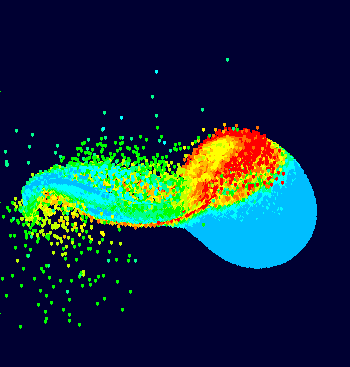Godzilla, if you'll recall, is an ancient, Jurassic beast, revived by the denotation of atomic weapons. Godzilla is, in part, about nature seeking revenge on humans for their destructive agency. Godzilla is nature's wrath, but Godzilla's proximate (or even ultimate) cause is human. Thus, he serves as the environment's check on human agency. Godzilla, like a toxic spill is, is a harmful environmental presence caused by human actions (and thus, it seems, reducible to them).
The Troll Hunter proceeds (spoiler alert) in a similar manner for sometime, before taking a different, and instructive path. This film (of the found footage variety) follows three Norwegian university students as they film a documentary about illegal bear hunting. Following someone who they believe to be responsible for a slew of poachings, the students discover that the individual is not hunting bears but hunting (or rather, managing) a population of trolls, which the government is keeping a secret. It seems the trolls are acting up and moving beyond their traditional ranges, which also entails killing German tourists and eating livestock. The troll hunter, who works for the Troll Security Service (TSS) is trying to get to the bottom of all this: to figure out what is driving the trolls so that they can be controlled. It turns out that one rogue troll is responsible for all the trouble: he has escaped his territory (defined by a circular ring of inconspicuous electric lines--an allusion perhaps to the original Godzilla film where the Japanese construct a similar ring of electrical lines around Tokyo to keep Godzilla out). This troll is both killing and infecting other trolls with an unidentified illness or virus.
After securing a blood sample (an incredible dangerous and violent job) and taking it to veterinarian, we discover that the trolls are suffering from rabies. And here is the moment when The Troll Hunter departs from the Godzilla model. Humans have been attempting to control (by measures, preserving and conserving) the troll population in Norway. For instance, the troll hunter recounts a terrible story of a time when he had to exterminate a large group of trolls (including baby trolls) as part of this government cover-up. The movie, in other words, is not at a loss to condemn human beings when it comes to our relationship to the environment and its nonhuman inhabitants (nor I am). But what the film also suggests (or can be made to suggest) is that human beings are not the whole show--we are not the end and be all of the earth (one way or the other). The trolls have rabies. They are not being driven mad by climate change (this is, full disclosure, what I guessed at, early in the film, as the cause of the trolls' troubles--this increased my surprise, and later, interest in the rabies twist) or even habitat destruction (although these are certainly part of the story). They were being driven by a cause quite apart from humans. Their relationship with humans is being shaped by their relationship with things other than humans.
My choice of The Troll Hunter might still seem odd given the obvious influence on Godzilla on the human imagination with respect to the violence and volition of nature. Godzilla in its many iterations is clearly compelling and vibrant in his/her own right. However, what most interests me in the troll is that its cause, in contrast to Godzilla, is not, strictly speaking, human. What drives the rogue troll in The Troll Hunter is not nuclear war or waste or global warming (anthropological climate change) but rabies. The Troll Hunter reveals not, to borrow from the Blue Oyster Cult that "again and again how nature points up the folly of man" but that, and perhaps quite often, man has very little to do with "it" one way or another. The Troll Hunter can thus be read as an object-oriented environmental rhetoric of the sort I am working toward.



